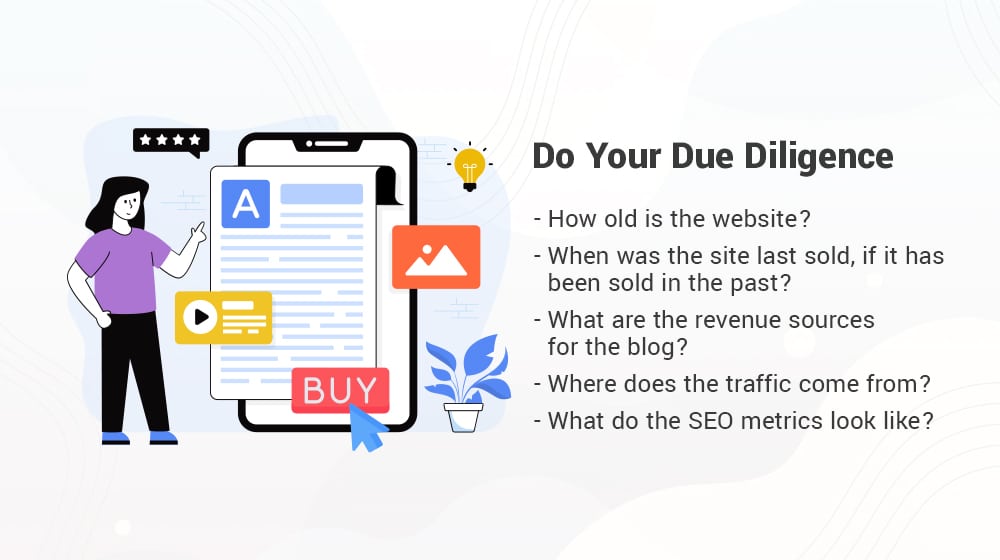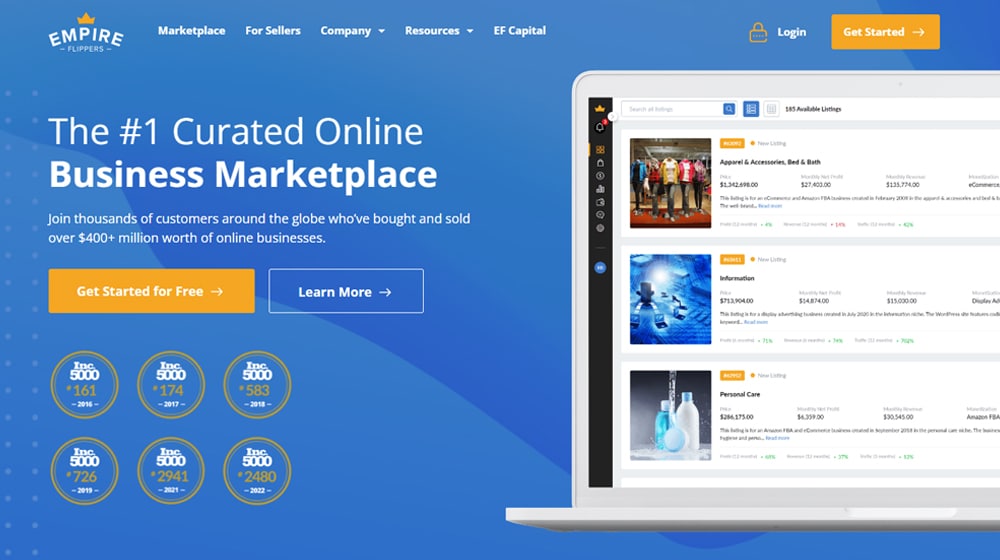If you're interested in starting an online business, you're going to need to get into blogging. Content marketing is far too important to ignore these days. So, maybe you've started asking for advice from bloggers. One thing they'll all tell you is this: blogging is a lot of work. It's a long, slow process that relies on steady investment, attention to detail, and more than a little luck.
So why not just skip all of that and get right to the good part?
No, I'm not talking about blogging hacks or secret shortcuts or unethical strategies that might fly under the radar of the search engines for a while. I'm talking about the greatest shortcut of all: money.
Did you know that you can just go out there and buy a blog?
 It's true. It requires a decent chunk of change, some investigation and due diligence, and a lot of consideration, but it can be done. It happens all the time. In fact, there are people who specialize in starting and growing blogs just to sell them.
It's true. It requires a decent chunk of change, some investigation and due diligence, and a lot of consideration, but it can be done. It happens all the time. In fact, there are people who specialize in starting and growing blogs just to sell them.Should you buy a blog, or does the risk outweigh the reward? Let's talk about the details.
1. Buying a blog is a great way to shortcut the process of establishing an online business. It cuts all of the tedious months of establishing a site and getting it indexed, getting Google to pay attention to it, and getting it ranked. You never have to look at an analytics page, look at five hits a day, and wish you could gain more exposure. You skip all of that and get right to the point where you have an audience, a content library, customers, revenue, and more.
That right there is the single biggest benefit to buying a blog. It saves you anywhere from months to years of time, depending on how much you know about digital marketing and blogging.
2. Another significant reason to buy a blog is that revenue stream. You can buy a blog and have a guaranteed passive income stream. It's not as though the blog's customers all leave when you buy it, right? Okay, sure, sometimes the audience is made up of fans of the owner, and when the owner leaves, they'll leave too, but that's not terribly common. Most of the time, an audience doesn't hugely care who owns the blog as long as the content is still what they want.

3. Many blogs also have an associated network of additional accounts and resources. You could gain a Facebook page, an Instagram page, a Twitter account, and more. These may have large audiences of engaged followers, and they're ready for you to keep rolling. It's a built-in audience you can keep and, eventually, leverage into other purposes.
4. Another great benefit is the authority that comes with owning the blog and its associated business. This does rely on you buying the site publicly rather than transferring ownership of a business behind the scenes, but it has the potential to be a stepping stone into prominence.
 Consider: Elon Musk is one of the most famous and richest people in the world, and he did it primarily by purchasing businesses and attaching his name to them. You won't be the next Musk just by buying blogs, but you could be the next Darren Rowse or Neil Patel.
Consider: Elon Musk is one of the most famous and richest people in the world, and he did it primarily by purchasing businesses and attaching his name to them. You won't be the next Musk just by buying blogs, but you could be the next Darren Rowse or Neil Patel.Each blog you buy adds to your portfolio, gets you more passive income, and gains you authority you can leverage into larger purchases over time.
Cool, right?
Buying blogs isn't without risk. In fact, some of the risks are immense, which is why relatively few people actually do it. Well, that, and because the good blogs are rarely up for sale. You won't likely be buying the niche-leading authority sites, not without a significant budget. So, what are the drawbacks?
The first and greatest risk is simply that you don't know how to maintain the blog as it is.
Blogs are a lot of work, remember? That work doesn't stop once your blog gets big enough to make a decent income. If anything, it becomes even more work because there are more details to manage and higher stakes at play.
A few SEO mishaps, a missed schedule, or a couple of minor issues with voice and style, those are all forgivable. The real potential damage comes if you don't know the audience and the monetization strategy for the blog. Do you know how the money is made, and can you keep it going? Do you know what actions you can take to improve it and which ones will ruin your investment?

Another risk is not knowing what the niche entails. Blogs thrive on expert content, and if you're not an expert, you better be prepared to hire a few. You can't buy a blog about electrical engineering and expect to step in to write authoritatively about it when you don't know the first thing about voltage and amperage.
Even if the blog is profitable as it is, you need to be prepared to keep it rolling, and that means producing more content, maintaining your community and authority, and working to grow and engage your audience.
Another risk is that the blog may have all of its eggs in one basket. If the blog relies on one topic that is largely time-sensitive and viral, it may be up for sale because the writing is on the wall that the business model is about to collapse. Remember, people invested in HD-DVD before it collapsed when Blu-Ray took over.
One of the biggest driving factors here is SEO and the Google algorithm. Plenty of sites look good to Google for now, but if the search engine changes their algorithm, it could tank those sites literally overnight. It's happened before, many times, and it will happen again.
 There's also always a possibility that the site is being misrepresented. That's why it's critical to do your due diligence when investigating a site to buy.
There's also always a possibility that the site is being misrepresented. That's why it's critical to do your due diligence when investigating a site to buy.Most good website brokers and trustworthy markets will do some of this for you, but there's always going to be an element of "buyer beware" and the risk of buying a lemon. Furthermore, there are no lemon laws to protect you from yourself.
Doing your due diligence means gathering information about the blog you're considering buying and making sure that all of the details match your expectations and your needs. Mostly, it means asking questions and looking for answers that don't jeopardize your investment.

These questions include:
Another potentially valuable piece of information is why the site is being sold. Sometimes, the owner has simply lost interest and doesn't want to shut it down or disappoint the audience and community. Sometimes personal circumstances mean the site owner can't maintain it. Sometimes their own financial situation demands that they make money somehow.
Other times, the site is being sold by a flipper that did a quick refurbish, SEO audit, and a few basic improvements and is selling it for more. Or, maybe there's a search penalty or other problem that needs to be addressed. Maybe a new competitor is about to launch, and they don't believe they can compete.
All of this is important information to know before you decide to purchase a blog. Maybe it all aligns, and you have a great investment on your hands. If so, great! Go for it.
There's just one detail left: how much will it cost to buy a blog, if you're interested? The truth is, it varies a ton, depending on the site itself.
In general, you can expect to pay somewhere between 30-50x the average monthly profit the site makes. In fact, here are a few real prices pulled from listings at the time of this writing:
Most sites are listed at a price that makes sense in only two situations. The first is that you plan to run the site as-is indefinitely. Taking 45 months to pay for your investment is a long timeline, but if you plan to own the site for 10+ years, it can be a good investment.

The other situation is with the expectation that you intend to grow the site. A site that makes $135 per month isn't really all that much, but if you can invest in it and within a year start making $1,350 per month (which, despite being 10x, isn't all that difficult), you end up with an excellent source of revenue. Or, a site you can then re-sell for 45x that new $1,350 to make an incredible return.
This is the difference between a starter blog and an established blog. Established blogs are harder to grow by leaps and bounds, but they're a lot more stable where they are. Starter blogs are cheaper but make less, but with the right investment, they can be made to make significantly more.
If you've read all of this and you think it's a good idea to buy a blog, now you need to find one.

There are a bunch of options available to you, including:
You can also find Facebook and LinkedIn Groups dedicated to buying and selling websites, as well as the occasional private community on other social media or chats like Discord. Getting an invite to one of those may be difficult, though.
Does the number of digits in the price of a blog, the amount of work involved, or the daunting nature of the task put you off buying a blog? Do you still want to put money into a website, but you don't want to build it yourself? Do you need somewhere to start to get off the ground? Why not do a soft buy?
A soft buy isn't really buying a blog, or if it is, it's buying a bottom-barrel starter blog. Then, all of the money you would have paid for a better blog goes right into paying people to manage it for you. Pay for content by hiring writers, content creators, and blog managers. Pay for ads, pay for exposure, anything it takes. The investment can take a simple, low-profit blog and turn it into something amazing.

Truly, the choice is yours. Maybe you find that you like growing new sites more than you like running old sites, or maybe you prefer the buy-improve-sell flipping process. Either way, there's a place for you in the world of buying blogs.
We encourage you to share this article on Twitter and Facebook. Just click those two links - you'll see why.
It's important to share the news to spread the truth. Most people won't.